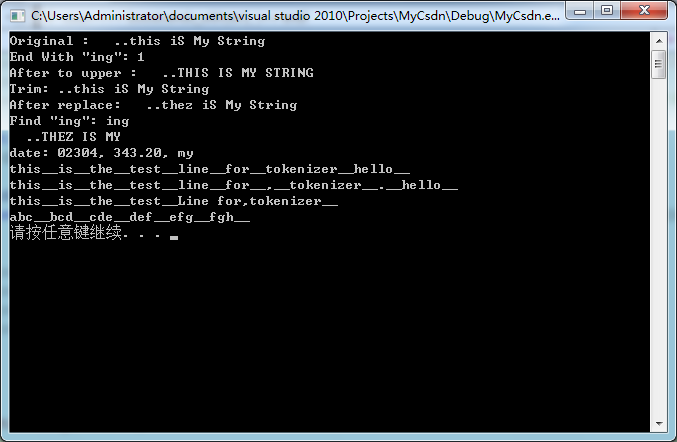boost有丰富的字符串处理和格式化输出库。
boost::string_algo
用于字符串大小写转换,比较,修剪和查找
boost::format
用于字符串格式化输出,如printf一般.
boost::tokenizer
用于字符串分割
下面是测试代码:
#include <boost/algorithm/string.hpp>
#include <boost/format.hpp>
#include <boost/tokenizer.hpp>
void TestStringFormat()
{
//
// 字符串处理和格式化输出
//
// string_algo: 字符串大小写转换,比较,修剪,特定字符串的查找
string str1 = " ..this iS My String";
cout << "Original : " << str1 << endl;
cout << "End With \"ing\": " << boost::ends_with(str1, "ing") << endl; // 判断是否以"ing"结尾
cout << "After to upper : " << boost::to_upper_copy(str1) << endl;; // 转换为大写, _copy:不改变原字符串
cout << "Trim: " << boost::trim_left_copy(str1) << endl;; // 删除左侧的空白字符
boost::replace_first(str1, "this", "thez"); // 替换"this"为"thez"
cout << "After replace: " << str1 << endl;
boost::iterator_range<std::string::iterator> ir = boost::find_first(str1, "ing");
cout << "Find \"ing\": " << string(ir.begin(), ir.end()) << endl;
vector<char> v(str1.begin(),str1.end());
vector<char> v2= boost::to_upper_copy(boost::erase_first_copy(v, "String")); // 删除"String"部分之后转换为大写字符,赋值v2
for(int i=0; i<v2.size();++i)
{
cout << v2[i];
}
cout << endl;
//
// format: 格式化输出
cout <<
boost::format("date: %05d, %.2f, %s")
% 2304
% 343.2
% "my"
<<endl;
//
// tokenizer 分割
string strLine = "this is the\ntest\tline for,tokenizer.hello";
boost::tokenizer<> tok(strLine); // 缺省的情况下,以空白字符,标点作为分隔字符
for (boost::tokenizer<>::iterator it = tok.begin(); it != tok.end(); it++)
{
cout << *it << "__";
}
cout << endl;
// char_separator
boost::char_separator<char> cs;
boost::tokenizer<boost::char_separator<char> > tokcs(strLine, cs); // 默认保留标点但将它看作分隔符
for (boost::tokenizer<boost::char_separator<char> >::iterator it = tokcs.begin(); it != tokcs.end(); it++)
{
cout << *it << "__";
}
cout << endl;
// char_separator自定义
string strLine1 = "this|is|the-test*Line for,tokenizer";
boost::char_separator<char> custcs("|-*"); // 自己指定
boost::tokenizer<boost::char_separator<char> > tokcs1(strLine1, custcs);
for (boost::tokenizer<boost::char_separator<char> >::iterator it = tokcs1.begin(); it != tokcs1.end(); it++)
{
cout << *it << "__";
}
cout << endl;
// offset_separator
string strLine2 = "abc bcd cde def efg fgh";
boost::replace_all(strLine2, " ", "");
int offsets[] = {3};
boost::offset_separator os(offsets, offsets+1); // 每隔3个字符
boost::tokenizer<boost::offset_separator> tokos(strLine2, os);
for (boost::tokenizer<boost::offset_separator>::iterator it = tokos.begin(); it != tokos.end(); it++)
{
cout << *it << "__";
}
cout << endl;
} 运行效果图:






















 1169
1169











 被折叠的 条评论
为什么被折叠?
被折叠的 条评论
为什么被折叠?








